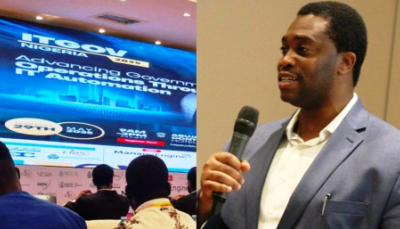NARICT is committed to Nigeria’s development
African countries are notoriously disinclined to funding research institutions and according to the United Nations, budgetary allocations in all African countries on science and technology research oscillate between 00.5% to 0.7 of their yearly budgets. Despite its much touted policy thrust on funding science and technology research, Nigeria has one of the leanest allocations for this sector in the globe when you consider its huge population and earnings. Not surprisingly therefore, funding for the Zaria-based National Research Institute for Chemical Technology (NARICT), one of Nigeria’s research institutions, has been most inappropriate. But NARICT appears undaunted in its efforts to make a mark despite lean budgets and Abuja’s weak support. NARICT has developed a tomato paste technology that will save Nigeria N19 Billion annually. In an interaction with eT Edge News SEGUN ORUAME, MARTIN EKPEKE and MOSHOOD ABUBAKAR in Zaria, the Director General, Prof. Idris M. Bugaje itemizes NARICT’s milestones including using solid waste, coal and agricultural residues to produce liquid fuel and the biotech fertilizer project among several others that hold the aces to diversifying Nigeria’s economy and ending years of ‘unruly’ importation of everything from abroad.
What exactly is NARICT’s petrochemical venture all about?
NARICT has decided to make the petrochemical its own flagship from last year and the idea is not just the conventional petrochemical plant which you have in Eleme and some other refineries in Kaduna, now we are trying to make it a different field stock to produce liquid fuels, we are trying to make the use of municipal solid waste as well as coal and agriculture residues also to convert them to liquid fuel such as methanol, ethanol; chemicals like ammonia, nitric acid as well as urea fertilizer and this is very visible technically. We attempted to build the first pilot plant probably in tropical sub Saharan Africa on that but there are so many challenges we would need to overcome eventually. Our cities are littered with this pure water waste, damaging the serenity of the environment and at the end of the farming season, farmers burn all their agricultural waste, the corn stocks, the maize cobs and so on which are not being utilised for food. This is very wrong. We can now convert this into useful chemicals as well as liquid fuels.
For an average Nigerian, fuel comes only from crude oil and from an economic perspective that is what the country relies on. But NARICT is looking at other alternatives, what are the challenges to bringing these alternatives to the market?
The major challenge is finance but we don’t want it to down our efforts. The second major challenge is the technology itself; it is a little bit hi-tech area. Our engineers here have done the design of the plant and cost has been completed. We are now looking for partners for the fabrication because some of the units will operate at 100 degree pressure, if you go beyond ten barrel there are no facilities in Nigeria for that kind of work and we are going at 100 bar, 100 atmosphere pressure, so we had to look for partners. We tried South Africa, there was no positive response, we got a partner in Canada, they agreed to work with our team of engineers but unfortunately maybe from our understanding the Canadian government was not ready to get that technology released from a political perspective. We tried going through the foreign ministry and they refused and we understand why, basically this are hi-tech areas, this was the technology which Adolph Hitler used during the 2nd World War to supply fuel for his troops from coal, this was the same technology apartheid South Africa used during the oil embargo at the time when British Petroleum was renamed African Petroleum in this country. This is that same technology countries are keeping very close control on. One third of fuel consumed in South Africa that flows through their petrol stations comes from coal; only two third comes from crude oil.
If NARICT has a research blueprint to provide alternative fuel why is funding from government a problem?
We have serious problem with government. Interest and funding of our proposal for this kind of technology is nothing really to write home about. Look at the billions being wasted away all over the places, now we are asking for N480 million only and last year they allocated the budget only N50 million which was not released.
I was speaking with the DG of NOTAP Dr Umar Bindir and I said, will you consider Nigeria a failed state and he said ‘No,’ Nigeria is not a failed state and now I am listening to you, is it that NARICT is not doing enough of pressure or creating enough awareness because this can change the dynamics of things?
I made a presentation in South Africa, many people from Zimbabwe, South Africa itself even wanted to come to NARICT to see what we have done because they were interested in this technology and they have realised the value, the group from Zimbabwe said they were looking towards plasma technology for conversion of solid waste into liquid fuel and they have realised our own project would deliver even much better and they were interested in coming but I told them please hold on, we are only on the drawing board up till now we haven’t built any structure which can be seen. Across the world people realised this but not at home. We have made presentation to the National Assembly Committee on Science and Technology, we have written papers. We started since 2011. It was my flagship as soon as I came in here. For us, we have done our best, I told the minister, we have told everybody who needs to know but people do not seem to realise that this will not only going to clean up our cities but also transform the entire energy sector of the country. Every part of the country can produce its own liquid fuels from waste things which are useless.
I am looking at your tomato paste project, what has NARICT got to offer?
Since November 2011, we realised a lot of tomatoes is produced in this country and almost half of it is wasted in the farms because the farmers do not have the technology to process it. Nigeria has been the second largest producer of tomato in Africa yet we spent N19 billion to import tomato paste from China which is a big irony and the tomato paste coming from China may not be safe because a lot of food we import to this country are genetically modified and we don’t seem to realised the danger in consuming genetically modified food (GMF). In Europe they don’t allow any GMF to come into their country even from North America. Two years ago, US took Europe to WTO to complain that they are putting trade barriers. They had to do that because they were victims of the mad cow disease. In Nigeria, we don’t even have the framework to check those things and we believe we need to add value to our tomato: reduce the waste and conserve foreign exchange and this is what this technology is all about. Throughout the country all the tomato industries have all collapsed in the past twenty years simply because the technologies were not sustainable, they did not even have the spare parts to maintain them. The tomato paste company in Ikara was bought from Hungary and after the eastern revolution, the Hungarian company folded up and stopped producing the machineries and spare parts, there was nobody who could give the Nigerian company the spare parts so they eventually folded up. When I went to Vietnam on a visit 20th December 2011, I saw a technology being used by the Vietnamese with which they were even exporting tomato paste to Germany and I told them to give me a unit so I can take it home. They said you don’t need to carry this bulky items to your country we will give you the design you can go and fabricate it but I insisted if you give me the engineering design, please give me your team of engineers who will come to supervise and train my own engineers and they agreed for a small fee. They sent their three engineers who were here for four months. We have now domesticated that technology. It’s a simple technology and produces one tonne per day. Across the entire Fadama, one tonne means processing about two hundred baskets of tomato per day. For any small Fadama that is a very large investment. Nigeria cannot process its tomato or consume its own tomato during its peak and off peak period and even probably export tomatoes. The technology is fully domesticated and all the spare parts are available in NARICT. The fabrication is also fully made in NARICT; nothing came from outside the country meaning we can have something appropriate for this country; something that is sustainable and if we spread this out across to the Fadama areas, Nigeria will be self sufficient. The domestication has just been concluded, and we intend to invite other stakeholders so that we can sell our idea to them.
If funding is so meager, it means as a country we are not committed to science and technology?
We are not committed and we are not ready. Nigeria is committed in making noise probably in drawing attention negatively across the globe but as far as simple technologies go we are not even committed. If you know the kind of hurdles we went through to domesticate this tomato technology you wouldn’t believe it. We didn’t have any serious budget for it. We had to struggle here and there to make sure it works and we really appreciated the effort of the Vietnamese team and the Nigerian Ambassador in Vietnam, he was the one pushing it that he wanted to see something achieved.
There is a committee on science and technology in the National Assembly. Is it that they are not doing enough or they don’t really know that technology can transform the country? Are we not mis-focused as a country?
If government thinks they are serious on science and technology; both the executive and the legislature let them give funding to science and technology. When you give less than 0.01% of your budget to science and technology, how can there be any transformation? Transformation is an engineering word. If I give you the meaning of transformation in thermo dynamics then you will realise Nigeria is nowhere. You can transform from one level to another but it requires certain quantum of energy. Quantum of input of science and technology and all those things are missing in this country. The budget is not implemented. Ours was so little. You wouldn’t believe our budget as a research institute last year and it was so poorly implemented that we got only 40% of N250 million for all our projects. How can anybody take government seriously on science and technology? Government has to invest more. The little money for the whole ministry was just about N36 billion last year even security is taking N946 billion and out of our N36 billion the average of 40% implementation was achieved. Sincerely, Nigeria may not be a failed state but we are on the process of failure because the focus is not there on science and technology. We are not giving it the requisite attention. Since the creation of our ministry, there is no specific line budget for research itself. Do you realised that we are only given capital for infrastructure, we are giving salary budget to pay salaries and overheads for day to day running but there is no specific provision for research itself. What do I give my staff to do research? Somebody can wake up the following morning with a very good idea that may just cost him one or two million to put together but there is no allocation for that in the entire budget. If you go to the Federal Ministry of Education, they provide about N100 million only for research and development, it may look small at least there is provision for that. But in our ministry, there is nothing like that. There is no commitment. I think if government is not serious let them merge all the institutes with universities. Let us contribute to education rather than wasting our time here without proper funding. We have lots of ideas and want these ideas to transform this country and if these provisions are not made you are not making good use of us. Some of us feel like we should just relocate to another environment and make our contributions and see the result of those contributions being materialised.
If you have the opportunity of asking the National Assembly or the Federal Government directly for things that would change the status quo, what will you ask for?
We shall ask for the implementation of the new Science and Technology Policy because the new policy launched last November has articulated a clearer roadmap of the development of science and technology in this country. First, it has created the Science and Innovation Fund or rather Research Innovation Fund which I think will greatly assist research institutes not only in the ministry of science and technology but all other ministries where research is being conducted and that proportion of the GDP has to be provided to that National Research and Innovation Fund – that one is very fundamental because funding is the main problem. Secondly, we need to identity cutting edge technologies and make very serious investment into those technologies. Some of the technologies many research institutes are busy working on are not cutting edge and they will not be economically competitive because the Chinese have gone very far. Nigeria needs to identify cutting edge technologies areas like nano-technology, bio-technology and related areas in technology like the kind of waste programme we are trying to establish here, these are areas which will give Nigeria advantage because we are living now in a globalized world so you have to identify areas of your strength and try to build on that so that you can have comparative advantage at the global level. Nigeria needs to identify those niche areas and let us invest more money into those areas for the development of the nation.
Don’t you see a need to partner with the private sector so that you can commercialize your research findings and then generate funds to do other things?
For the tomato project we are already in the process of partnering with the private sector. Talking about the nation generally, 90% 0f the research output of our research institutes are not commercially viable.’ We are only making noise; about 90% of the technologies we are researching on are not viable; they are technologies which globally we have passed that level.
One would have thought the outcome of your research should feed the industries who could take from where you stopped for mass production, what is wrong?
The small scale industries in Nigeria have all collapsed. Nobody is producing anything, and everybody is importing everything. That is the challenge. We don’t even have the industry to collaborate with. The problem is the industries that should take over our researches have disappeared because of the power problem. Many of them in Kano moved to Lagos, many are now relocating to Ghana and the bigger ones don’t want to deal with you because they prefer to import. ‘You wouldn’t believe our budget as a research institute last year and it was so poorly implemented that we got only 40% of N250 million for all our projects.’ Since the creation of our ministry, there is no specific line budget for research itself …. We are giving salary budget to pay salaries and overheads for day to day running but there is no specific provision for research itself. I think if government is not serious let them merge all the institutes with universities. Let us contribute to education rather than wasting our time here without proper funding.




























